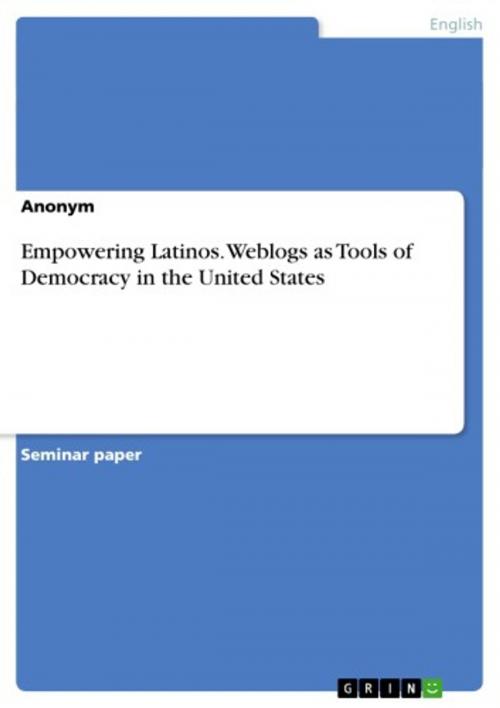Empowering Latinos. Weblogs as Tools of Democracy in the United States
Nonfiction, Entertainment, Drama, Anthologies| Author: | Anonymous | ISBN: | 9783640664542 |
| Publisher: | GRIN Publishing | Publication: | July 19, 2010 |
| Imprint: | GRIN Publishing | Language: | English |
| Author: | Anonymous |
| ISBN: | 9783640664542 |
| Publisher: | GRIN Publishing |
| Publication: | July 19, 2010 |
| Imprint: | GRIN Publishing |
| Language: | English |
Seminar paper from the year 2005 in the subject American Studies - Culture and Applied Geography, grade: 1,0, Duke University, language: English, abstract: Just a little over ten years ago, the first website became accessible to the public and even though the World Wide Web of today is still in its teens, it has become a phenomenon of virtually global impact. By the mid 1990s, people started to discover the joys of online communication via socalled weblogs or blogs, but blogs really evolved at the turn of the millennium, when the international blogosphere virtually exploded. Anyone could create one, anyone could participate in one, and everyone had at least heard of one. Blogs revolutionized online communication by creating worldwide communities of technology nerds, ambitious writers, and simply those who found an outlet for their exhibitionist tendencies. Decades earlier, in 1981, renowned German philosopher and sociological theorist Jürgen Habermas published his seminal work Theory of Communicative Action, in which he formulates a theoretical framework for societal progress achieved through communication. In the United States of today, progress and the means of communication are inherently White, in fact knowledge and societal power are White. This research is designed to look at the question of democratic empowerment among the Latino minority, this is, whether weblogs provide the Latino immigrant community with means to connect, exchange information, and thus gain social and political influence by the power of knowledge. Is it possible for Latinos in the U.S. to use the medium of weblogs according to Habermas' theory and change the distribution of knowledge and power in American society? Habermas' approach will be described as the theoretical framework for this research paper. It will then be determined how the Latino community in the U.S. could or could not use the weblog as a tool of empowerment.
Seminar paper from the year 2005 in the subject American Studies - Culture and Applied Geography, grade: 1,0, Duke University, language: English, abstract: Just a little over ten years ago, the first website became accessible to the public and even though the World Wide Web of today is still in its teens, it has become a phenomenon of virtually global impact. By the mid 1990s, people started to discover the joys of online communication via socalled weblogs or blogs, but blogs really evolved at the turn of the millennium, when the international blogosphere virtually exploded. Anyone could create one, anyone could participate in one, and everyone had at least heard of one. Blogs revolutionized online communication by creating worldwide communities of technology nerds, ambitious writers, and simply those who found an outlet for their exhibitionist tendencies. Decades earlier, in 1981, renowned German philosopher and sociological theorist Jürgen Habermas published his seminal work Theory of Communicative Action, in which he formulates a theoretical framework for societal progress achieved through communication. In the United States of today, progress and the means of communication are inherently White, in fact knowledge and societal power are White. This research is designed to look at the question of democratic empowerment among the Latino minority, this is, whether weblogs provide the Latino immigrant community with means to connect, exchange information, and thus gain social and political influence by the power of knowledge. Is it possible for Latinos in the U.S. to use the medium of weblogs according to Habermas' theory and change the distribution of knowledge and power in American society? Habermas' approach will be described as the theoretical framework for this research paper. It will then be determined how the Latino community in the U.S. could or could not use the weblog as a tool of empowerment.















